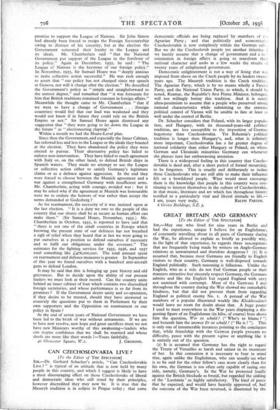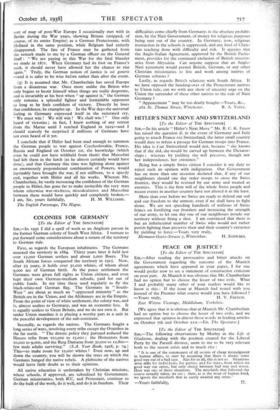GREAT BRITAIN. AND GERMANY [To the Editor of THE SPECTATOR]
SIR,—May one who lived for nine years in Berlin and had the experience, unique I believe for an Englishman, of constantly travelling, about in all parts of Germany during the War, be allowed to explain as briefly as pdssibly why, in the light of that experience, he regards three assumptions that are frequently being made by writers on Anglo-German relations as unwarranted and therefore dangerous ? (z) It is assumed that, because most Germans are friendly to English visitors to their country,' Germany is well-disposed towards England politically. Such reasoning is fallacious. Unlike the English, who as a rule do not find German people or their manners attractive but sincerely respect Germany, the Germans admire and like the English 'but regard England with envy not unmixed with contempt. Most of the Germans I met throughout the country during the War showed me remarkable kindness, but that did not prevent them from regarding England as political enemy No. 1. A perusal of the War numbers of a popular illustrated weekly like Kladderadatch would leave no room for doubt about that. A huge poster I used to meet everywhere in the War years displaying a dis- gusting figure of an Englishman (in kilts, of course) bore above him the question, Wer ist schuld ? (" Who's to blame ? ") and beneath him the answer Er ist schuld ! (" He is ! "). This is only one of innumerable instances pointing to the conclusion that, while friendship with the. German people presents no difficulty, peace with the present regime or anything like it is entirely out of the question.
(2) It is assumed that Germany has the right to regard the Treaty of Versailles as harsh and unjust in its treatment of her. In this connexion it is necessary to bear in mind that, again unlike the Englishman, who can usually see what is to be said for the. other fellow's case. more clearly than for his own, the German is too often only capable of seeing one side, -namely, Germany's. Id the War he protested loudly
against the British bloCitade as brutal, but regarded the sinking of the Lusitania ' .as .highly satisfactory. The kind of peace that he expected, and Would have heartily approVed of, had the outcome of the War been reversed, is illustrated by the
sort of map of post-War Europe I occasionally met with in Berlin during the War years, showing Britain (stripped, of course, of its entire Empire) as a German Protectorate, with Holland in the same position, while Belgium had entirely disappeared. The fate of France may be gathered from the remark made to me by a German officer on the General Staff : " We are paying in this War for the fatal blunder we made in 1871. When Germany had its foot on France's neck, it should never have allowed her the chance to rise again." Truly, the German notion of justice is sui generis —and it is safer to be wise before rather than after the event.
(3) It is assumed that Mr. Chamberlain has saved Europe from a disastrous war. Once more unlike the Briton who only begins to bestir himself when things are really desperate, and is invariably at his best when " up against it," the German only remains a splendid fighter and formidable opponent so long as he feels confident of victory. Directly he loses that confidence, he crumples up. In the War days the universal feeling in Germany expressed itself in the reiterated cry, " We must win ! We will win ! We shall win ! " One only heard of victories ; in fact, I knew nothing of any retreat from the Marne until I reached England in 1919—and I should scarcely be surprised if millions of Germans have not even heard of it yet.
I conclude that if Hitler had been mad enough to summon the German people to war against Czechoslovakia, France, Russia and England on October 1st, the knowledge (which even he could not have withheld from them) that Mussolini had left them in the lurch (as he almost certainly would have done), and that Germany this time was fighting alone against an enormously preponderant combination of Powers, would inevitably have brought the war, if not stillborn, to a speedy end, together with Hitler and all his works. Whereas Mr. Chamberlain, by vastly increasing the confidence of the German people in Hitler, has gone far to make invincible the very man whom otherwise war-madness, miscalculation and Mussolini between them would have quickly and completely broken.—

























































 Previous page
Previous page